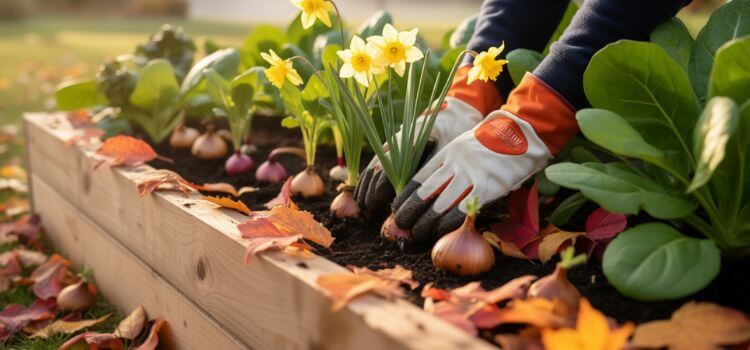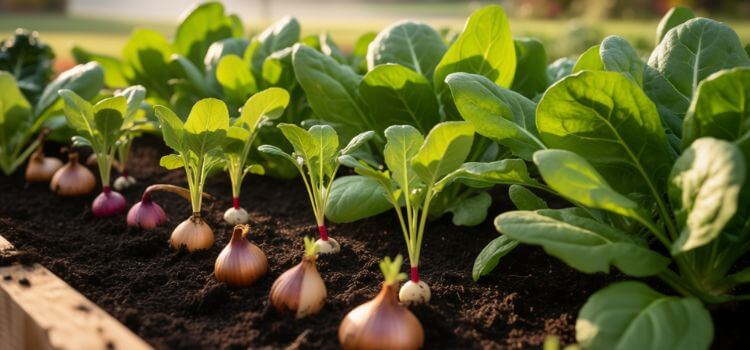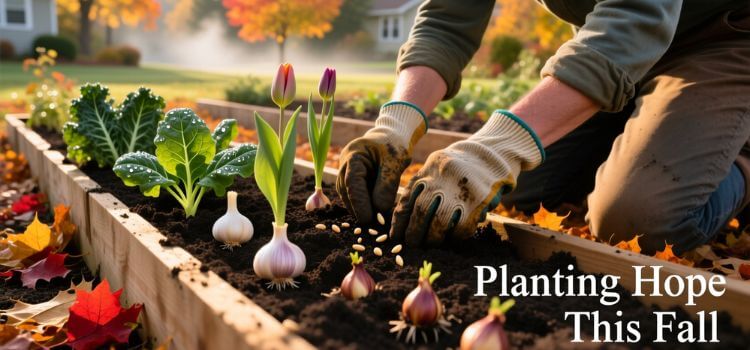As an Amazon Associate, I earn from qualifying purchases.
October is a magical month for gardeners. The air is crisp, the sunlight softens, and the soil still holds warmth from summer. But what should you plant now to make the most of your garden? Many people think fall is only for harvesting, but October is actually one of the best months for preparing a thriving garden for the next season. If you’re wondering what to plant in October, you’re in the right place.
I remember my first October garden. I was nervous because I thought the growing season was over. But after planting garlic, spinach, and tulips, I had one of the most rewarding spring harvests I have ever experienced. Nothing beats seeing little green shoots breaking through the soil after a chilly month. Have you ever felt the joy of watching life grow from tiny seeds? That’s precisely what October planting gives you.
Why October is Perfect for Planting
Many people believe that spring is the only time to plant. But fall offers several advantages. First, the soil is still warm enough for roots to establish before winter. Second, cooler air reduces stress on young plants. Third, planting now means that by the time spring arrives, your plants are more vigorous and ready to produce a bountiful harvest.
Studies show that garlic planted in October develops better bulbs than garlic planted in spring because the roots establish before the cold sets in.

Vegetables to Plant in October
Here’s a list of vegetables that thrive when planted in October:
1. Garlic
Garlic is one of the easiest and most rewarding crops to plant in fall. Break the cloves and plant them pointy side up, spacing about 4 inches apart. Cover with mulch to protect them from frost. By next summer, you’ll have flavorful, homegrown garlic.
Why Garlic Works in October:
- Requires cold dormancy to develop large bulbs
- Low maintenance once planted
- Adds flavor to countless dishes
Tip: Water moderately and avoid overwatering.
2. Onions and Shallots
Both onions and shallots are well-suited for fall planting. They need a period of calm weather to grow strong roots. Plant sets or small bulbs in loose soil and they’ll establish before winter. Early spring will reward you with robust stems and flavorful bulbs.
Pro Tip: Mulch lightly to prevent frost heaving.
3. Radishes
Radishes are quick-growing and perfect for October. They tolerate frost well and can be harvested in 3–4 weeks. Sow them directly into the soil in rows, and enjoy crunchy, spicy radishes before winter fully arrives.
I planted radishes under a protective row cover last October. By early November, I was picking crisp radishes for my salads.
4. Spinach and Lettuce
These leafy greens love cool weather. October planting gives you tender, flavorful leaves through late fall and even winter if your area is mild. Spinach and lettuce grow best in fertile, well-draining soil.
Tips for Success:
- Use row covers to protect from frost
- Keep soil consistently moist
- Thin seedlings to avoid overcrowding
5. Kale and Mustard Greens
Kale and mustard are hardy greens that thrive in cold weather. They even taste sweeter after exposure to cold. Plant them in fertile soil, and you can harvest leaves well into winter.
6. Beets and Carrots
Beets and carrots can be sown in October, particularly in regions with mild winters. Quick-maturing varieties will produce roots before frost sets in, while others can overwinter under a layer of mulch.
Carrots left in soil under a light mulch can survive cold temperatures and be dug as needed.

Flowers to Plant in October
Fall is an ideal time for planting spring-blooming flowers.
1. Tulips and Daffodils
Plant bulbs in October for a stunning spring display. They need a cold period to bloom properly. Plant at a depth of 6–8 inches and water lightly.
2. Crocus and Hyacinths
These early bloomers add color to your garden when most other flowers are dormant. Plant in clusters for a natural, organic appearance.
I always plant tulips and crocus near walkways. When they bloom, they surprise guests with early spring color.
Herbs to Plant in October
Some hardy herbs thrive when planted in fall:
- Thyme: Hardy and fragrant; harvest leaves all winter
- Oregano: Thrives in cool temperatures; grows well under mulch
- Sage: Perennial; prefers fall planting for strong root growth
Tips for Successful October Planting
- Prepare the soil: Remove debris, add compost, and loosen the soil.
- Mulch generously: Protects roots from frost and keeps soil moist.
- Water wisely: Establish young plants, but avoid overwatering or waterlogging.
- Use row covers: Shields tender crops from early frosts.
- Choose hardy varieties: Select vegetables, herbs, and flowers suited for cool weather.
Note: Always check the frost dates for your region to time your planting perfectly.
Table: Quick Overview of October Planting
| Plant | Type | Days to Harvest | Frost Tolerance | Tips |
|---|---|---|---|---|
| Garlic | Bulb | 180–210 | High | Mulch to protect roots |
| Onions | Bulb | 120–150 | Medium | Plant sets in loose soil |
| Radishes | Root | 20–30 | High | Sow directly in rows |
| Spinach | Leafy Green | 40–50 | High | Use row covers for protection |
| Kale | Leafy Green | 55–65 | High | Frost improves taste |
| Beets | Root | 50–70 | Medium | Overwinter under mulch |
| Tulips | Flower Bulb | 180 | High | Plant 6–8 inches deep |
| Daffodils | Flower Bulb | 180 | High | Full sun for best blooms |
| Thyme | Herb | Ongoing | High | Harvest leaves through winter |
Frequently Asked Questions
Q1: Can I plant tomatoes in October?
A: Tomatoes are warm-season crops. October planting is not recommended because frost may damage young plants.
Q2: How do I know what vegetables grow best in October?
A: Look for cool-season crops like leafy greens, root vegetables, and bulbs. Refer to the USDA Hardiness Zone map for guidance.
Q3: Can I grow herbs in October?
A: Yes, hardy herbs like thyme, oregano, and sage thrive when planted in October. Mulch helps protect them from frost.
Q4: Should I water newly planted crops in fall?
A: Yes, water moderately to help roots establish. Avoid overwatering, as cooler weather slows evaporation.
Q5: Can I plant directly in the ground or use containers?
A: Both work. Containers provide better control over soil and protection from frost, while ground planting is suitable for hardy crops.
Conclusion
October is not the end of the gardening season—it’s the start of a new opportunity. By planting vegetables, herbs, and flowers now, you set yourself up for a vibrant, productive garden. Gardening in October is like planting hope: even when the days shorten and the air chills, life continues under the soil, waiting to bloom.
Note: Fall planting is easier than you think, and the joy of seeing shoots in early spring is unforgettable.
So, which crops will you plant this October? Garlic, spinach, tulips, or maybe all of them? Your garden is waiting—let’s get growing!

